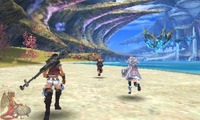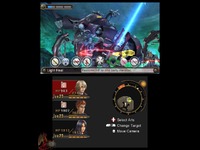|
|
 |
PLATFORM
|
New
3DS |
BATTLE
SYSTEM
|
 |
INTERACTION
|
 |
ORIGINALITY
|
 |
STORY
|
 |
MUSIC
& SOUND
|
 |
VISUALS
|
 |
CHALLENGE
|
Moderate
|
COMPLETION
TIME
|
More than 80 Hours
|
|
OVERALL

|
+
Enthralling story in a unique
world
+
Fun, deep, and fast-paced
battle system
+
Fantastic soundtrack enhances
the action
+
Massive environments to
explore
-
Graphics are a mixed bag
-
Not balanced for a straight
story run
|
Click
here for scoring
definitions
|
|
|
Xenoblade
Chronicles was the most acclaimed of the
three RPGs that made a splash during the late
stages of the Wii era. Now on the New 3DS, this
game from the creators of the Xenosaga
trilogy comes with a lot of hype, especially for
those who didn't really get into the Wii release.
While the port leaves a good amount to be desired
in term of technical prowess, Xenoblade
itself more than lives up to the hype, providing a
grand adventure on the go. It even manages to make
a very strange setting work so well that players
will hardly question it by the end of the game. Xenoblade
Chronicles is the rare complete package of
gameplay and story.
The story
begins with a brief history of the game's world
where two massive titans, the Bionis and the
Mechonis, battled until they both stopped moving.
Many years later the struggle appears to be
continuing as the Homs, a human-like species,
battle against invading Mechon, mechanical
creatures from the Mechonis. Here the player is
introduced to Dunban, a fierce warrior who wields
the Monado, the only weapon capable of damaging
the Mechon, though it can also share this power
with nearby allies. Dunban and company are able to
repel the invaders, but he overuses the Monado and
becomes injured and can no longer wield the blade.
A year later, Shulk, who becomes the protagonist
of the story, takes up the Monado when the Homs'
colony is attacked by Mechon.
Thus the
journey begins as Shulk and friends seek to put an
end to the Mechonis menace, but of course the
story is far more complicated than this simple
setup would imply. Xenoblade Chronicles
does a tremendous job of building up the lore of
this strange two titan world, and does so without
ever speaking down to the player. Instead, things
come up in the natural progression of the story so
the player is able to gradually learn the story of
the Bionis and Mechonis worlds without having
massive story dumps. Cutscenes generally have a
good length, being long enough to provide solid
development, but not so long as to drag on and
keep the player from the action.
The playable
cast further enhances things, as the all-British
cast does a fantastic job bringing them to life
without falling into any anime stereotypes. Even
the one mascot character is anything but annoying,
and as it turns out is the oldest party member
complete with a wife and kids. Shulk is the
blandest of the party members at first, but he
grows as the game goes along, making him a very
worthy party leader by the time the game reaches
its later stages. Character interactions between
the companions are constantly one of the
highlights of the game, and additional scenes
between them can be unlocked based on who the
players uses in battle. Xenoblade's story
mixes these entertaining characters with an epic,
and at times thoughtful, story in a way that is
very rarely seen in games. As events reach their
conclusion, players will find themselves caring
quite a great deal about what happens to Shulk,
his friends, and the strange world they live on.

Despite the graphics downgrade,
Xenoblade's environments can
still look great. |
|
Seemingly to
match the grand scale of the story, gameplay is
focused on exploring and battling in the game's
massive environments. Going with a party of three
at a time, battles happen seamlessly in real time
as players encounter enemies. Xenoblade is
not an action game, however, as players use an
action bar for the character they are controlling.
Skills have cooldowns instead of using any sort of
magic points, so players can focus on watching
those and using skills at the right time without
having to worry about a resource pool. Characters
also continuously auto attack whatever they are
targeting during battle, so combat is not button
mashy at all. What makes the skill system
interesting is the majority of skills have a
secondary effect such as a status ailment or will
interact with the skills of other members in the
party. For example, one character may have an
attack which inflicts the break status ailment on
an enemy and another will have a skill that
inflicts an even worse status ailment if the enemy
is already suffering from break. Effectively,
equipping the right skills on party members and
using them at the right time becomes fun and
engaging, encouraging players to use all the party
members to learn their skillset.
What keeps the
player from being too overpowered is the fact that
only one character is player controlled, with very
limited power over what the rest of the party is
doing. Full party control is limited to simple
commands such as having everyone attack the same
target. Party members' AI does behave reasonably,
but skill combinations won't be easy to pull off
on a regular basis. The party get a shared "chain
meter" to use, which builds up as combat proceeds.
This serves a few functions including a chained
attack when completely full which gives the player
gets full control of the party for a single
instance of entering commands. In addition,
singular segments can be used to revive fallen
party members.
The most
interesting usage however, involves the flashes of
the future that Shulk gets. When a powerful attack
is incoming, combat will pause and the player will
get a glimpse of an oncoming attack, including how
much damage it will inflict and whether it will
knock out the character in question or cause
status ailments. After this a countdown begins,
allowing the player to react to the oncoming
attack in a variety of ways. The player can
increase or decrease their aggro to change the
target of the attack, use various healing skills,
or use the chain meter for single segments to warn
one of the other characters. This gives the player
the opportunity to use one of that character's
skills to try and change the outcome of the
attack. These flashes make an already fantastic
battle system even better. The one downside to
this is in some tough battles the flashes can come
far too frequently, bogging down the pace of
combat.
Players can
upgrade skills as a character levels, using points
earned in combat, but oddly the higher levels of
skills are locked behind books that must be
purchased or found later in the game, which feels
a bit forced. In addition, each character has
three trees of passive skills that can be switched
between, and these can link to other characters
they have gained affinity with, allowing a bit of
customization of passive skillsets. While not
allowing an overabundance of customization,
combined with the fun of finding a good party
setup, there is plenty for players to mess around
with.
 Xenoblade's
boss battles are fun and
intense. Xenoblade's
boss battles are fun and
intense. |
|
Progress in Xenoblade
is largely linear with the next story objective
clearly pointed out. The player is free to fully
explore all open areas and complete as many
sidequests in them as they please. Making this
much more enticing is the fact that all previous
areas can easily be teleported to, with multiple
checkpoints available, which makes getting around
the large game world super easy. The game's areas
are fun to explore, and though the next story
location is always pointed out to the player,
exactly how to get there isn't always clear. This
makes exploration an essential part of the game
and having a map on the bottom screen is a nice
improvement over the original. There are many
available sidequests, but they're mostly fetch
quests with only small amounts of additional
story. They are a nice incentive to have while
exploring, as they award a good amount of
experience, and often don't require returning to
the original request maker.
One major
problem with Xenoblade's openness is that
it appears to be balanced towards those who spend
a good amount of time exploring. Players who just
want to stick primarily to the story will find the
need to grind at various intervals, halting the
progress of the story and likely causing
frustration. It seems like this port would have
been a fine opportunity to find some balance
fixes, but there don't appear to be any changes to
difficulty. It's a shame, as given the quality of
the story, a path that doesn't require players to
veer off from it would have been nice. Even so,
the grinding required is never a great amount, so
players won't be stuck too long. All in all, Xenoblade's
mix of exploration and combat is intoxicating,
with only an occasional bump along the way. The
game is quite long, but there's a nearly endless
amount of fun to be had along the way.
Graphics in the
original version of Xenoblade certainly
weren't always great, but they prove to be a bit
more of an issue in this port. Character models
look particularly jaggy when up close, and at
times don't look better than late PS1 era graphics
as many textures in environments look even blander
than they did on the Wii. The trade-off is that
the game runs smoothly with only a rare bit of
slowdown during gameplay. It's still mostly a good
looking game, as large areas are impressive and
character models look fine when the camera angle
isn't zoomed in on their jagged edges. The game's
soundtrack was great in the original and remains
so here, with a variety of orchestral and rock
themes that perfectly fit whatever situation
they're used for. Players will definitely want a
good set of headphones to play this game.
Xenoblade
Chronicles is a phenomenal RPG that hasn't
been given the most extensive port that one would
hope for, but is still impressive for being scaled
down to a handheld. The story is interesting and
entertaining, with a loveable cast of characters
that are well written and well-acted. The
graphical downgrade and lack of any real updates
will be disappointing to fans of the original, but
all of the quality found in the Wii version still
shines through. There are some balance and
character progression issues of course, so it
isn't perfect. Even with these problems, Xenoblade
Chronicles still embodies everything we love
about RPGs and remains entertaining throughout its
incredible eighty plus hours.
Review
Archives
|









